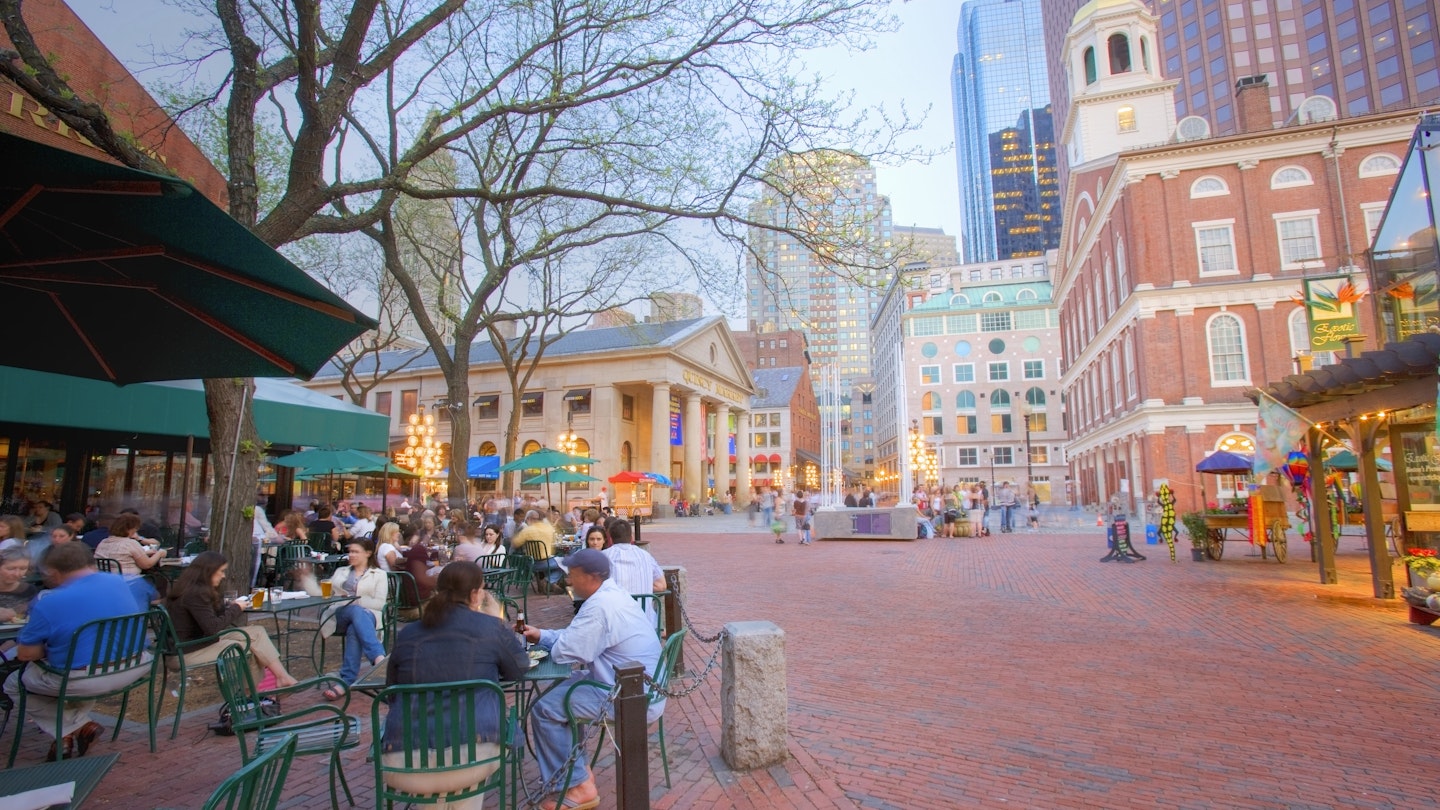Boston is a curious and intriguing mix of a modern, bustling city packed with culture, thriving nightlife, and historical monuments that firmly bind this urban metropolis to its roots as a key player in the creation of the USA.
Visitors can see this in the distinct personalities of the city’s neighborhoods and how they were formed. The historic heart of Boston sits on a small peninsula tucked between the Charles River and Boston Harbor. Not much more than two square miles, this area includes Downtown, a dynamic mix of modern commercialism and historic sights; the North End, the city’s Italian enclave; and Beacon Hill, known for its quintessential Boston charm.
In the 19th century, as the city grew, the swampland to the south and west was filled in to create new, grand neighborhoods—the South End, Back Bay, and Fenway—with wide avenues, graceful architecture, and renowned cultural institutions.
The most recent transformation took place in the Seaport District, where docks and parking lots morphed into gleaming buildings and endless possibilities. This guide will cover everything you need to know about exploring Boston’s wonderful neighborhoods.
Downtown
Best for historic sights
This area between Boston Common and Boston Harbor is where the city grew, and it’s still the center of the action. Towering office buildings sit side-by-side with historic edifices from earlier centuries, including Faneuil Hall and Quincy Market. White-collar workers hustle to and fro while visitors cluster around tour guides in colonial-era garb.
The bulk of the Freedom Trail sights are here, as well as the Rose Kennedy Greenway and the New England Aquarium. While it’s a tourist hotspot, there’s certainly a lot to see and do—you don’t want to miss this essential Boston neighborhood.
Downtown overlaps with the lively theater district, which draws crowds after dark. This small area is packed with theaters, including the ornate Boston Opera House, along with various nightclubs.
North End
Best for Italian eats
For nearly a century, this tight-knit neighborhood was the exclusive domain of Italian immigrants and their descendants, who imported ingredients from the old country and cooked up succulent dishes using recipes handed down through generations. The North End’s main street, Hannover St, is lined with Italian bakeries, cafes, pizzerias, and osterias.
For a taste of authentic pizza, try Galleria Umberto (lunch only, as they close when the pizza sells out) or Modern Pastry for cannoli. You’ll find plenty of dinner options, but you can’t go wrong at Carmelina’s.
The North End is a fabulous place to stroll, shop, and indulge in Italian cuisine. Locals often converse in Italian while enjoying the neighborhood’s atmosphere in Langoni Park.
Beacon Hill
Best for old Boston vibe
Beacon Hill is arguably Boston’s most photogenic neighborhood, known for its stately federal-style row houses, gas-lit brick sidewalks, and blooming gardens. The mostly residential area is delightful to explore, showcasing fascinating African American history highlighted along the Black Heritage Trail.
Charles St, the commercial area, is lined with antique shops, boutiques, and unique gift shops. It’s a compact but charming place to shop, with several eclectic and independently owned stores. Don’t forget to stop by Tatte Bakery for a coffee break.
Charles St leads to the Public Garden, a 24-acre oasis filled with ponds, flowers, and tasteful statues. It’s a highlight in every season, whether enjoying vibrant blooms or the serene beauty of snow-covered landscapes.
Seaport District
Best for contemporary culture and nightlife
The Seaport District has transformed into a hub of modern glass and steel structures that host some of Boston’s hottest dining and nightlife. The area features the Boston Convention Center, cruise ship terminal, and several hotels, resulting in a constant influx of visitors year-round.
By day, stroll along the HarborWalk for marvelous city views, visit the Institute of Contemporary Art (ICA) to explore modern artistry, and uncover hidden parks and pop-up shops.
Seafood remains a traditional dinner choice along these former fishing piers, but today you’ll find a variety of cuisines that continuously evolve with the city’s dining scene.
South End
Best for art markets and open studios
The South End is home to Boston’s most creative residents and its vibrant contemporary art scene. The SoWa Art & Design District along Huntington Ave is the center of this artistry, where studios, galleries, and boutiques thrive in former warehouses. Monthly events like First Fridays celebrate local artists, while the SoWa Open Market combines a farmers’ market with an artist fair.
The South End’s dining options are diverse and innovative, offering everything from Italian cicchetti at Coppa to Spanish tapas at Toro. For those who enjoy Asian cuisine, Myers + Chang is a great choice, and B&G Oysters remains a favorite for seafood lovers. The Boston Center for the Arts serves as a mini cultural hub, fostering creativity and expression.
Back Bay
Best for Boston architecture
Back Bay is Boston’s most elegant neighborhood, featuring handsome brownstones lining grand avenues. Copley Square, encircled by architectural icons like the Boston Public Library and Trinity Church, is the neighborhood’s centerpiece. Art and architecture enthusiasts could easily spend an afternoon soaking in these distinctive buildings.
Shopaholics will revel in Newbury St, a one-mile stretch of art galleries and local designers alongside international chain stores. Take a pause at one of many eateries when the shopping becomes too much.
Fenway
Best for live music and baseball
Home to Fenway Park, America’s most beloved ballpark, Fenway is not just about baseball. It’s also a hub for Boston University and several smaller colleges, making it a vibrant area with diverse nightlife options. Check out TimeOut Market for multiple dining options under one roof.
This neighborhood balances lively sports culture with esteemed cultural institutions like the Museum of Fine Arts and the Isabella Stewart Gardner Museum, catering to a range of tastes.
In conclusion, Boston’s neighborhoods each offer distinct experiences, showcasing the city’s rich history, cultural diversity, and vibrant modern life. Whether you’re a visitor or a local, there’s always something new to discover in this dynamic city.




